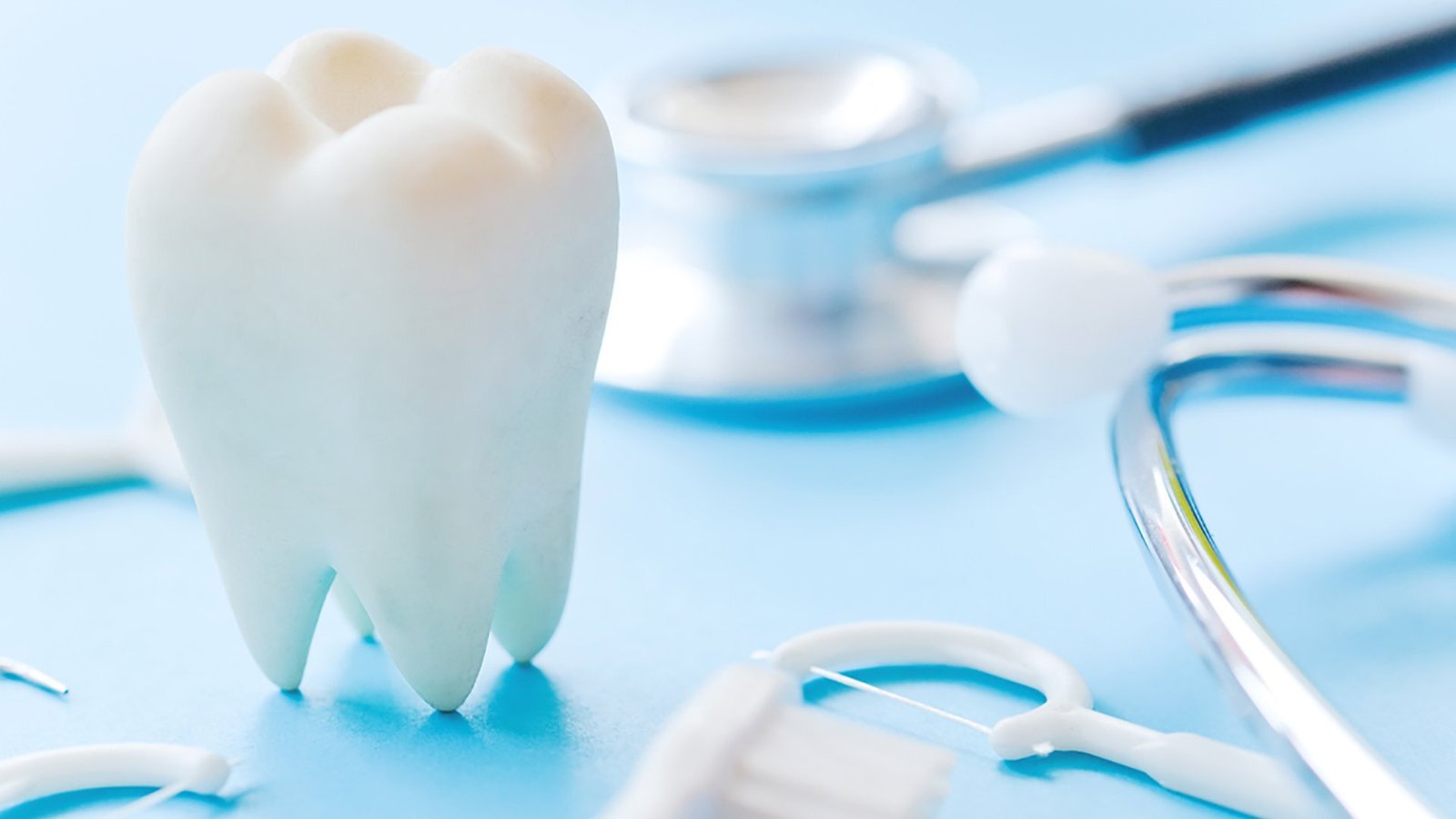A common question that arises when selecting a material for dental restoration is PMMA vs zirconia! They each have their own specific characteristics, advantages, and uses in dentistry. The question that remains is, which one is a better fit for you? The following article covers PMMA vs zirconia in more aspects than one, which helps you determine whether zirconia vs PMMA dental crowns, PMMA vs zirconia in dental prosthetics, or PMMA vs zirconia dental implants better suit your case as a whole in terms of cost, durability, esthetics, and clinical implementations. Aidite, which has been certified by numerous professional organizations around the world, focuses on providing smart solutions for advanced dental materials.
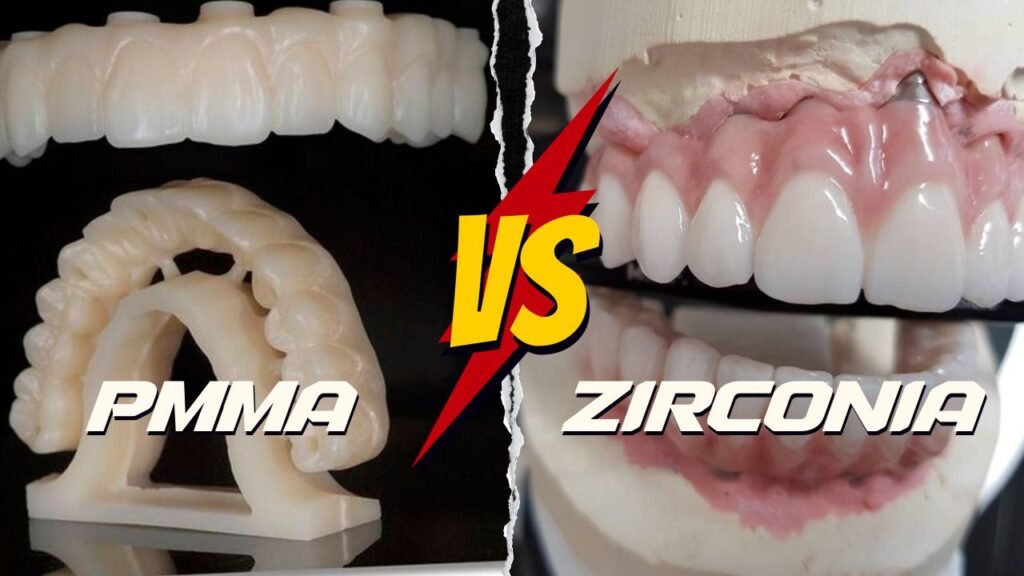
What Is PMMA?
PMMA (Polymethyl Methacrylate) is a synthetic acrylic resin widely used in dental applications, particularly provisional restorations. The polymerization of methyl methacrylate monomers forms it into a solid, clear thermoplastic. Due to its biocompatibility and ease of shaping, PMMA is widely utilized for temporary dental prosthetics, PMMA vs zirconia in dental prosthetics as well as temporary dental implants, PMMA vs zirconia dental implants.
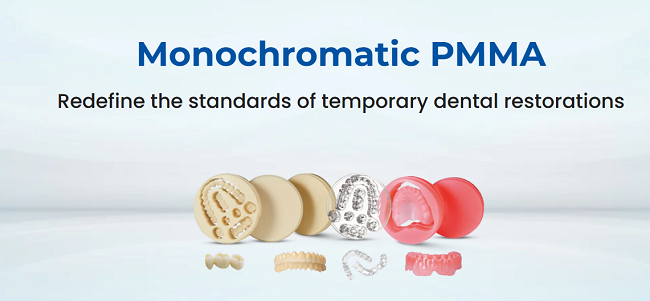
Common Uses:
- Temporary Crowns: You place them over the tooth while waiting for the permanent crown, which is usually mentioned in a zirconia vs PMMA dental crowns comparison.
- Bridges: Used as temporary bridges to hold the space and function while healing is taking place and a more permanent treatment plan is made.
- Dentures: Most often used in the base and teeth of removable dentures for their convenience and price.
- Surgical Guides: These are used to guide surgical implant placement accurately, by guiding surgical instruments
Advantages of PMMA
- Cost-effective: PMMA is a budget-friendly option that enables temporary solutions for all patients, especially when it comes to PMMA vs zirconia cost comparison.
- Rapid Fabrication: An easy milling or molding process reduces turnaround time between dental labs, making it a common option in PMMA vs zirconia in dental prosthetic applications.
- Lightweight: PMMA is a light material, which gives a more comfortable feeling to patients, especially in removable appliances.
- Aesthetics: Provides a natural appearance that can be tinted and polished to closely match natural teeth (when discussing zirconia vs PMMA dental crowns).
- Biocompatibility: Very low risk of causing allergic reactions, safe for oral cavity use.
- Easily Repairable: PMMA restorations can take damage over time. However, even this is easy to repair compared to replacing a whole zirconia dental restoration. This aspect is worth noting when considering PMMA vs zirconia dental implants.
Disadvantages of PMMA
- Poor Resistance: PMMA is not long-lasting, as it easily wears and breaks.
- Discoloration Over Time: Outlasts some foods, drinks, and oral bacteria, meaning it can change colors over time.
What Is Zirconia?
Zirconia (Zirconium Dioxide) is one of these phenomenal ceramic oxides that has high strength and additional nonparkental materials that are used for permanent restorations in Dentistry. Because of the ideal durability, biocompatibility, and natural-looking characteristics, zirconia is the choice material in PMMA vs zirconia dental implants and zirconia vs PMMA dental crowns discussions.
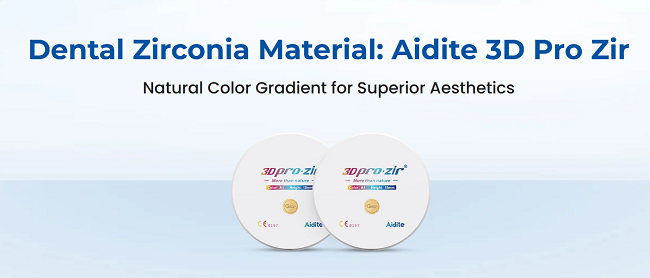
Common Uses:
- Permanent Crowns: Suitable for long-term application as they are more durable and have excellent aesthetic features.
- Bridges: Commonly used for multi-unit restorations when occlusal forces are present.
- Dental Implants: As abutments or full-contour implant-supported crowns—an important point in PMMA vs zirconia dental implants decision.
- Veneers: Sometimes selected for their natural appearance and high endurance to staining
- Posterior Restorations: Particularly efficient in high-stress-bearing parts, as strength is the top priority.
Benefits of Zirconia
- Unrivaled Strength: Because zirconia is almost fracture-resistant and resilient towards wear, zirconia is a perfect choice for lasting dental restorations.
- Better Appearance: Similar translucency as natural teeth, making it an ideal material for anterior (visible) teeth.
- Compatible with body: No known allergic reaction or contact dermatitis is found, allowing an ideal mouth condition.
- Versatile: Practical for use in crowns, bridges, implants, and even veneers in both the anterior and posterior regions.
- Stain Resistance: Less susceptible to stains compared to PMMA, maintaining its aesthetic longer.
- Low Maintenance: It does not tarnish or chip easily, which means that you will not need to keep getting it repaired.
Disadvantages of Zirconia
- Higher Cost: Temporaries should be budget-friendly, making PMMA vs zirconia cost comparison an important consideration, as zirconia restorations are costlier than PMMA.
- Technique Sensitive: The fabrication and placement of porcelain veneers require numerous materials, treatments, and techniques to increase chairside time and dependence upon experienced, skilled technicians.
Pros and Cons: PMMA vs Zirconia
The comparison between the two would be the benefits and cons of each solution, which in turn depends on your specific dental situation, making the decision of choosing PMMA vs zirconia sometimes tricky. Here’s a side-by-side look:
| Criteria | PMMA | Zirconia |
| Affordability | Very affordable (PMMA vs zirconia cost) | More expensive but long-term value |
| Aesthetic Appeal | Good, natural-looking | Excellent, tooth-like translucency |
| Durability | Suitable for temporary use | Extremely durable, long-lasting |
| Biocompatibility | Generally safe | Highly biocompatible and hypoallergenic |
| Ease of Fabrication | Quick and simple | Requires advanced tools and expertise |
| Repairability | Easy to repair | Less likely to need repair |
| Resistance to Staining | Prone to discoloration | Stain-resistant |
| Comfort and Weight | Lightweight and comfortable | Slightly heavier but well-tolerated |
| Use in Prosthetics | Temporary crowns, guides (PMMA vs zirconia in dental prosthetics) | Permanent crowns, bridges, implants (zirconia vs PMMA dental crowns) |
By contrasting these two types of materials, one can better comprehend their respective advantages and disadvantages to make the right choice for PMMA vs. zirconia dental implants, crowns, or prostheses.
Which Material Is Best for You?
The best option between PMMA vs zirconia depends on your particular dental requirements, how quickly you need a treatment, and your budget.
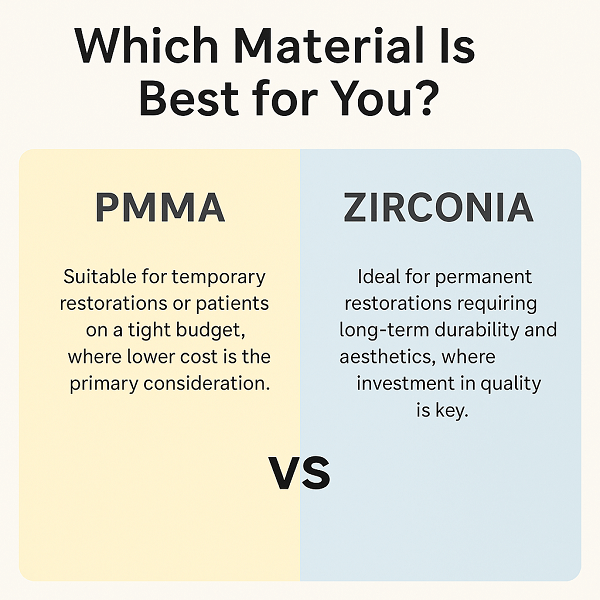
Go with PMMA if you will only need a temporary restoration, are receiving phased dental treatment, or want a more affordable choice. PMMA is really good for short term use where you have plans to eventually upgrade to something more permanent. Ever made it a great option for use cases where PMMA vs zirconia in dental prosthetics are involved.
If you want a more durable, more beautiful, and stronger solution, opt for zirconia. When compared to PMMA, PMMA is simply inferior for temporary restorations (or the comparison of zirconia vs PMMA dental crowns or PMMA vs zirconia dental implants), whereas zirconia is the best option for permanent restorations, particularly when function and aesthetics are the highest priority.
Both types of materials have their role in modern dentistry, whether you are analyzing alternatives with PMMA vs zirconia cost or clinical outcomes. Your dentist is best equipped to determine the material that will suit your particular case best, based on clinical considerations and personal preferences.
FAQs
Q1. Is PMMA safe for long-term use?
PMMA is ideal for provisional restorations. It is not as durable as zirconia and is also not a good permanent solution because they can wear and stain over time.
Q2. Which is more natural-looking: PMMA or zirconia?
In terms of aesthetics, zirconia is generally more aesthetic because of its translucency, making it more natural looking than PMMA as seen with natural tooth enamel, particularly in the visible areas such as the front teeth.
Q3. Can zirconia crowns be repaired if damaged?
Compared to the other types, zirconia is very strong, but once it chips or cracks, you will more often than not have to do a full replacement instead of a repair, like with PMMA.
Conclusion
To cover more bases, Aidite is providing PMMA and zirconia solutions. PMMA is great for these types of situations PMMA works well when you need a temporary, inexpensive material in the treatment planning process. Zirconia is the best-fit option for patients looking for strength, longevity, and aesthetics. A better understanding of the advantages, disadvantages, and clinical application of PMMA vs zirconia dental implants, zirconia vs PMMA dental crowns, as well as PMMA vs zirconia in dental prostheses enables wiser choices. So the right solution will end up being a combination of a recommendation from your dentist and your goals. Aidite is the best partner for every dentist and patient with reliable restorative materials for various stages of the dental voyage.



